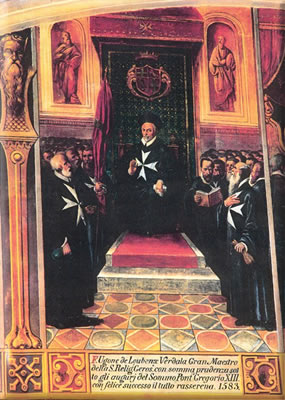Constitution

(Promulgated the 1st January 2001)
Article 1
The Sovereign Order of Saint John of Jerusalem is an international, ecumenical Order of Chivalry in direct continuity from the original Order of Hospitallers of Saint John founded in the Holy Land in the year 1048.
This Order became ecumenical and open to each religion discipline since His Highness Czar Paul I, Emperor of all the Russians was elected and accepted proudly to be Grand Master on 1798. The Order dedicates itself to humanitarian causes, development of schools and services in favour of people in need, establishment of medical centres and wants to expand contacts between peoples from all the monotheistic Confessions recognised in the world.
The Order does not interfere in politics.
Article 2
The Order is and will remain in perpetuity (GOD so willing) independent of any and all kingdoms, governments and other worldly authorities; its recognised sovereignty, independence, extra-territorial status and fons honorum having been honoured and substantiated by numerous Treaties, Acts, Bulls, Edicts and Ukases (like the Treaties of Amiens on 1802) by the continuing exercise of its ancient rights, privileges and prerogatives.
Article 3
The principal objectives of the Order are the furtherance of charity and the defence of the Human rights against all contrary dogmas.
Article 4
The Order is under the heavenly protection of Saint John, the anniversary of whose Nativity falls on the twenty-fourth (24th) of June and is celebrated as the Patronal Day of the Order.
Article 5
The Order may elect to have a Royal Protector and also Religious Protectors.
Article 6
The Order can recognise Hereditary Rights of the members and protect private property in the form of nobiliary titles and individuals’ Coat-of-Arms.
Article 7
The Motto of the Order is “Pro Fide, pro utilitate Hominum”.
Article 8
The governing body of the Order for diplomatic and legislative activities is the Government of the Order, wherein plenary legislative functions are vested in regard to the administration of the Order and its relations with all external governmental bodies.
Article 9
The Government is formed by the Prime Minister, elected by the Prince Grand Master or by the Governor (when so elected), and by a number of Ministers depending on the specific situation. Each proposed Minister must be previously approved by the Prince Grand Master or by the Governor if not nominated by one of them.
The Prime Minister and Ministers stay in office until they are revoked or they resign. Revocation must be voted by the majority of the Government, by the Grand Master or by the Governor.
Article 10
The Government has the legislative functions. Laws, Codes and Decrees issued by the Government must be ratified within 30 days by the Grand Master or by the Governor; if not ratified they are automatically void.
The contracts between members, will be concluded under the Laws and the Codes of the Order, including those pertaining to the following but not limited to: associations, partnerships, donations, successions, marriages, divorces, and separations.
In the herein matter, the members may always resolve their matters upon mutual agreement in writing. In the case of any disagreement between the contracting parties, and if not expressly indicated the contrary, they cannot address to the ordinary magistracy of the state on whose territory the contracts originated, resolving the controversy by a mandatory arbitration.
The arbitration will be conducted by a panel of three arbitrators, members of the Order, of which two will be named by each respective party and the third arbitrator (with function of president) will be designated by the Prince Grand Master, the Lieutenant Grand Master or the Governor.
The arbitral judgment will obligate the contracting parties.